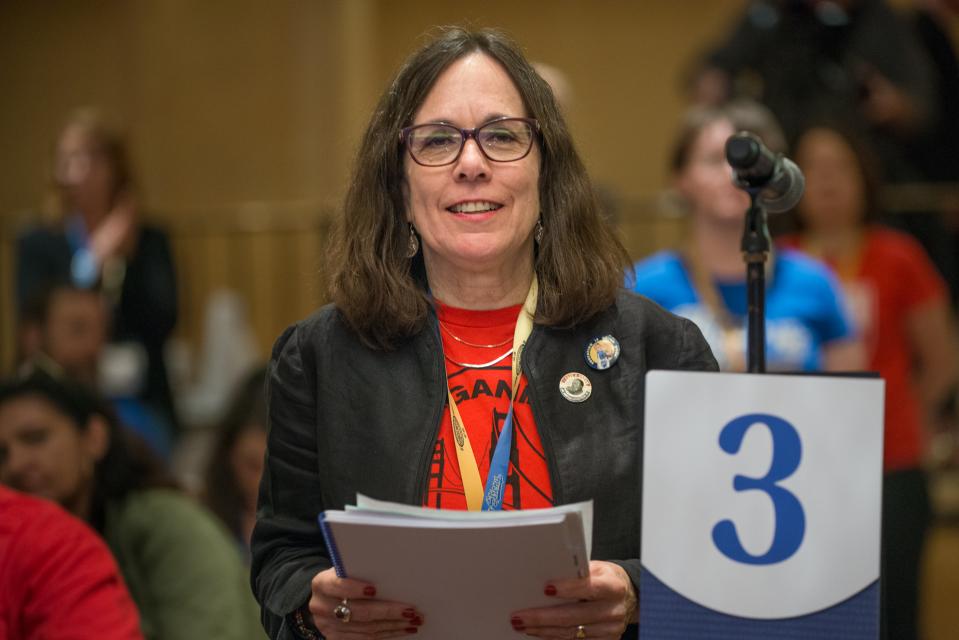Resolutions and Policy
Protect staff and students from the health risks of agricultural pesticides
March 25, 2018
Whereas, CFT members and the students and families we serve deserve healthy living and working environments that are free of chemicals of public health concern; and
Whereas, California communities who work and live near conventional agriculture are disproportionately affected by pesticide drift, which contaminates our water, soil, air, food, and bodies; and
Whereas, those impacted by pesticide drift are disproportionately Hispanic/Latino, and already subject to social, economic, and political discrimination; and
Support and defend undocumented members and students
March 25, 2018
Whereas, the CFT has a strong record of advocating for the rights of undocumented students and workers and of reaffirming solidarity with immigrant students, families, and communities; and
Whereas, President Obama took executive action to grant conditional and temporary status to 800,000 undocumented youth, granting them the right to work legally, by implementing the Deferred Action for Childhood Arrivals (DACA) program in 2012; and
Limit administrator staffing in adult schools
March 25, 2018
Whereas, too many adult education programs across California continue to struggle with insufficient funding to meet regional need; and
Increase funding for our students
March 25, 2018
Whereas, California’s current funding system is below the national per pupil average of $12,252 per student; and
Whereas, California’s current per pupil funding is $10,291 and places us at 41st in per pupil funding in the nation; and
Whereas, California is the fifth largest economy in the world; and
Whereas, the Local Control Funding Formula (LCFF) has generated a significant increase in funding to schools in California yet we still fall far below the national average; and
Seek sensible adjustments to CalSTRS contributions
March 25, 2018
Whereas, the financial crisis of 2007 caused by unethical lending practices of America’s largest financial institutions negatively impacted the health of CalSTRS; and
Whereas, in order to rectify a projected $74 billon unfunded liability within CalSTRS, the California Legislature passed and the governor signed AB 1469 (Bonta, D-Oakland) in June 2014; and
Whereas, AB 1469 was passed with limited open, public debate; and
Support for organizing noon duty staff in local unions
March 25, 2018
Whereas, over 1,500 noon duty staff across the state of California provide services to our students, parents, teachers, and support staff; and
Whereas, noon duty staff provide a safe, caring, nurturing, and welcoming learning environment for students; and
Whereas, noon duty staff are some of the lowest paid workers in a school district; lack the protection from unfair treatment and inequitable work hour distribution; and
Extend post-retirement health insurance coverage to COBRA participants
March 25, 2018
Whereas, currently, retiring teachers and college faculty (and their spouse) enrolled in a district’s health benefit plan who are not eligible for district-paid, post-retirement benefits, have the right under California Education Code, Section 7000 (sometimes known as AB 528), to buy into a district medical and dental insurance plan once retired under CalSTRS; and
Whereas, this section of the California Education Code does not specifically include those currently on the district’s COBRA plan; and
Exempt retiring educators from provisions requiring a reduction in benefits within the first 180 days of post-retirement reemployment
March 25, 2018
Whereas, the Public Employees Pension Reform Act (PEPRA) was intended to reduce potential abuses of the pension system, such as retiring on Friday with a pension benefit equal to 100 percent of the final salary and returning to work on Monday at that same salary; and
Oppose uses of retirement funds that enable privatizers of public education
March 25, 2018
Whereas, for the last several decades, wealthy individuals, using their for-profit companies, foundations, and fake grassroots groups, have been pushing for what they call “reform” of public education, from pre-K through higher education, but their “reform” is actually privatization that diverts public education tax dollars into private profits; and
Whereas in preK-12 these policies include but are not limited to:
Require charter schools to participate in CalSTRS
March 25, 2018
Whereas, the Charter Schools Act of 1992 granted charter schools the option of participating in CalSTRS or adopting another qualified retirement benefit plan for their employees; and
Whereas, currently 927 out of 1,085 California charter schools have opted to participate in CalSTRS, however the number of new charter schools electing to not participate in CalSTRS has increased in recent years raising concerns over the potential impact on the long-term funding of CalSTRS; and
Raise community college part-time faculty workload to 80 percent
March 25, 2018
Whereas, existing California law (Assembly Bill 951, 2008) establishes that the contingent, part-time faculty workload is capped at 67 percent, amounting to no more than 10 units, or approximately two to three classes; and
Whereas, existing California law (Assembly Bill 951, 2008) establishes that the contingent, part-time faculty workload is capped at 67 percent, amounting to no more than 10 units, or approximately two to three classes; and
Expand shared governance for UC non-Senate faculty
March 25, 2018
Whereas, in its 2012 report on “The Inclusion in Governance of Faculty Members holding Contingent Appointments,” the American Association of University Professors concluded that, “The inclusion in governance roles of faculty who hold contingent appointments…is crucial to establishing strong faculty governance” and recommends that contingent faculty have voting rights and be compensated for serving on governing bodies such as Senate committees; and
Protect UC lecturers against union busting by misclassification
March 25, 2018
Whereas, low-wage, low-benefit jobs at the University of California detract from the UC’s mission of education, research, and service and harm the communities in which UC campuses are situated; and
Whereas, in the past, UC campuses have inappropriately appointed non-Senate faculty who ought to be UC-AFT lecturers into non-represented positions such as “Adjunct Professor” and “Visiting Assistant Professor” in order to depress wages and benefits and deprive workers of union protections; and
Revise the community college Faculty Obligation Number to include noncredit instruction
March 25, 2018
Whereas, we, the Adult and Career Technical Education Committee, made up of K-12 adult schools, noncredit community colleges, and community technical education programs, are concerned with the Faculty Obligation Number (FON) being limited to only credit full-time faculty; and
Whereas, both credit and noncredit full-time faculty benefit students and colleges by providing critical services such as academic advising and ongoing curriculum development, and by participating in institutional planning and shared governance; and
Pursue legislation on reemployment preferences for UC non-Senate faculty
March 25, 2018
Whereas, student success is promoted when teaching faculty have long-term, stable appointments that enable them to be present for students; and
Whereas, the University of California relies on non-Senate faculty to teach approximately one-third of UC classes but treats that labor as fungible and disposable; and
Support academic status of UC librarians
March 25, 2018
Whereas, it is the policy of the state of California to encourage the pursuit of excellence in teaching, research, and learning through the free exchange of ideas among the faculty, students, and staff of the University of California; and
Fight sexism and racism at UC by analyzing wage gap and eliminating Student Evaluations of Teaching in personnel decisions
March 25, 2018
Whereas, women are disproportionately appointed into non-Senate faculty positions at the University of California, e.g., Senate faculty are one-third women, while lecturers are one-half women; and
Whereas, on average, Latina women in the United States are paid 54 cents, Black women are paid 63 cents, white women are paid 80 cents, and Asian women are paid 85 cents for every dollar a man makes; and
Oppose DeVos administration’s changes to Title IX
March 25, 2018
Whereas, Title IX is a federal law that prohibits gender discrimination in schools and legally requires institutions to respond to reports of sexual harassment and assault; and
Students not suspects: Oppose random searches
March 25, 2018
Whereas, students attend school for education and socialization; and
Whereas, students, especially in communities of color, are often treated with the presumption of guilt and their property is searched without probable cause, taking away valuable educational minutes and training students to become complacent in their rights; and
Whereas, random searches perpetuate and sustain the school-to-prison-to-deportation pipeline; and
Oppose and reject McTeacher’s Nights
March 25, 2018
Whereas, McTeacher’s Night is promoted as a fundraiser when in fact, it is a thinly veiled marketing tactic by which McDonald’s sells its products and promotes its brand to students and their families; and
Whereas, McDonald’s exploits school funding shortfalls in order to market — and profit from — the sale of junk food to children, undermining public institutions and teachers; and




